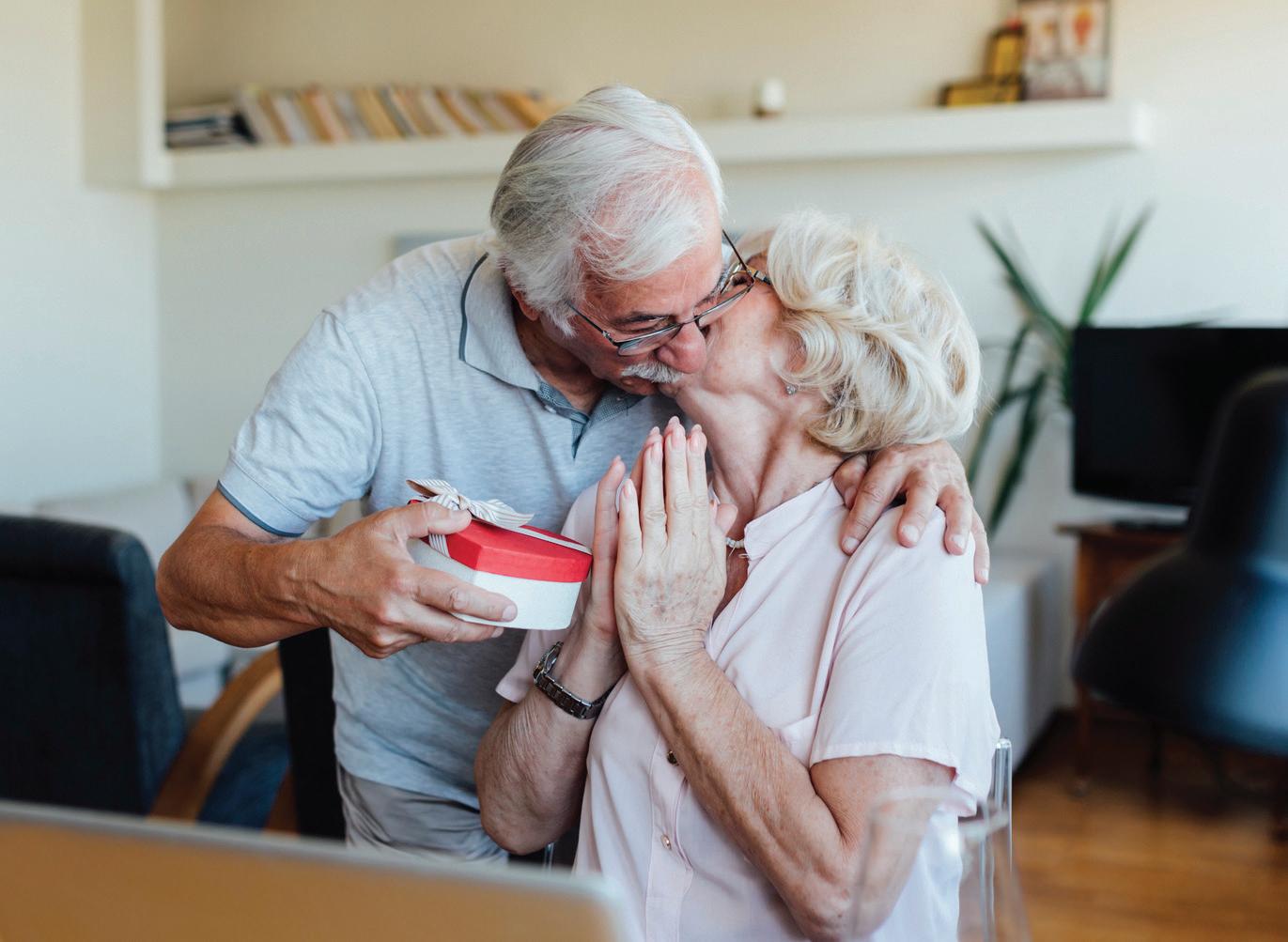
6 minute read
The History of KISSING
Learn about
The history of kissing
Advertisement
How do you show your love and affection? Many people do so through the tender gestures they share throughout the day, including kisses.
Kissing exemplifies love and passion and can express many different sentiments. A kiss also can provide comfort in a time of need.
Even though kissing may seem universal to human beings, it is not embraced by all cultures. Information
published in Psychology Today suggests kissing is not innate to all people. However, many still peck and kiss ardently. Even some animals are known to express affection through kissing. How did this behavior then come to be?
Two theories give some ideas about where kissing may have originated. Vaughn Bryant, an anthropologist at Texas A&M University who specializes in the history of the kiss, says the earliest references to kissing-like behavior dates to around 3,500 years ago in Sanskrit scriptures that influenced various Eastern religions. Kissing is mentioned in both Sumerian and Egyptian poetry. The Old Testament also references kissing in the book of Genesis when Isaac asks his son Jacob to kiss him.
Another theory is that kissing evolved from a process known as “kiss feeding.” This is when mothers would pre-chew food and then pass it to their babies.
Some suggest that kissing may be an extension of grooming behavior. That’s because primates such as bonobo apes frequently kiss one another. Dogs and cats also lick and nuzzle other animals and humans. This may indicate that so-called “kissing” is merely a way of communicating or grooming other beings as a form of establishing trust and bonding.
Even though people are not entirely sure about the origins of kissing, many men and women around the world engage in some form of kissing each and every day. The next time sweethearts lock lips, whether on Valentine’s Day or another time during the year, they can think about how kissing became the norm for showing love.


Health An outlook
better than optimism?
While looking at the sunny side of life offers a lot of light moments, there may be a better path to well-being.
Optimism feels good. The expectation that positive things will happen is associated with happiness and better health, including fewer heart attacks and a lower risk for premature death. Pessimism, on the other hand, feels bad; it makes you depressed or anxious and keeps the fight-or-flight system activated, triggering chronic inflammation (which is linked to many diseases).
You might think the best way to improve your well-being is to cultivate an optimistic outlook. Think again. “Better than cultivating an artificial optimism is to see the situation and the world realistically,” says Ronald Siegel, an assistant professor of psychology, part-time, at Harvard Medical School and medical editor of the Harvard Special Health Report Positive Psychology.
Are you fooling yourself?
Siegel says always assuming either an optimistic or pessimistic view of a situation is to ignore reality.
“If you’re pessimistic, your mind defaults to the fantasy that something horrible could happen. You’re filtering out the good data. If you’re optimistic, you’re filtering out the data that look bad for what you desire, and you’re fooling yourself,” Siegel says.
Instead of becoming attached to a fantasy of positive or negative outcomes, Siegel suggests that you focus on reality, and your resilience in facing reality.
“Have the faith in yourself that you’ll be able to rise to the occasion and deal with whatever comes your way, whether it’s good or bad fortune,” Siegel says. It’s much more robust for well-being than deluding yourself into thinking things will always turn out well, because sometimes they don’t.”
Finding the faith
The following steps can help you gain the confidence to cope with uncertainty.
Take refuge in the present moment. Remember that the future doesn’t exist yet; we only have thoughts about it. “Bring attention to the present moment: the sun is shining, the trees have lost their leaves, you can walk. Bring your attention to what’s here right now,” advises Siegel. “That’s not deluding yourself, that’s reality.”
Forge safe social connections. Having a good support system of friends and family helps us cope with life’s ups and downs. “Rather than deluding ourselves with optimism or pessimism, we can cultivate relationships so that when good things happen, we have people to celebrate with, and when bad things happen, we can comfort each other,” Siegel says. How can you build relationships during a pandemic? Siegel advises joining online groups and connecting with people via video or phone calls.
Identify with something larger than yourself. Broaden your connection to all of life: humanity, nature, the planet. “When you identify with something much more enduring than a current situation, you get beyond the need to cling to one particular outcome,” Siegel says. How do you connect to something larger? It can be through religion or simply history. “Bad things have happened throughout history, yet life has endured and it will continue to endure,” Siegel reminds us.
Find meaning in life. The final pathway to having faith to cope with uncertainty is finding meaning in life -- something that matters to you. The source of meaning is different for everyone, and it changes throughout life. Think of it as what gets you out of bed in the morning. “It could be art that you create, religion, a relationship, acts of service, or projects you’re working on. Whatever it is that matters, pursue it,” Siegel says. “Find ways to be engaged in meaningful activities.”
Becoming more mindful
Mindfulness brings your attention to the present moment. To try a mindfulness exercise, sit quietly, close your eyes, and focus on your breathing for a few minutes.
Slowly begin to widen your focus. Become aware of sounds, sensations, and ideas. Allow each thought or sensation to pass without judging it as good or bad.
If your mind starts to race, return your focus to your breathing. Then expand your awareness again. Try to sustain this awareness for longer periods each time you try this exercise.
Takeaway
It takes time to break old habits, and it’s okay if it’s hard to make a change and give up optimistic or pessimistic thinking. But even a little shift in your approach will improve your well-being. “We’ll all do better,” Siegel says, “if we live as though reality were real instead of being shocked by it.”

Health










